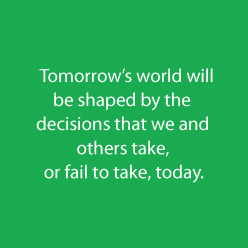About the foundation
Why we are Creating the FutureWorld Foundation
 Young people everywhere
need charts of the worldscape ahead. They will be responsible for the greatest transition in human
history. We must teach young people to understand this century and play its complex game. They must
be given the confidence to transform their lifestyles, and learn the solutions to the century’s
megaproblems. We can create civilizations more magnificent than anything yet conceived. We need the
political will to transform our world rather than wreck it.
Young people everywhere
need charts of the worldscape ahead. They will be responsible for the greatest transition in human
history. We must teach young people to understand this century and play its complex game. They must
be given the confidence to transform their lifestyles, and learn the solutions to the century’s
megaproblems. We can create civilizations more magnificent than anything yet conceived. We need the
political will to transform our world rather than wreck it. -- James Martin
The familiar metaphor of the "global village", unhappily, is flawed. While the global economy is highly integrated and its success has increased material wealth and welfare in most parts of the world, it has failed to create a community of citizens. Our global society is fractured, and there is no global polity.
Correcting this will not be easy: we have not invested the time and effort needed to create the coherent values and norms that bind communities together and allow different interests to be balanced and disputes resolved. Therefore the links we create and the behaviour we encourage are critical.
In the next 25 years:
- Surging global population (9bn by 2049, up from 2.5bn in 1950), increasing urbanisation and rising consumption will exhaust ground water and destroy marine life, biodiversity and the atmosphere
- Poverty - exacerbated in the most vulnerable areas by climate change and environmental degradation - and rapidly expanding urban slums will cause weak states to collapse, and force accelerated migration
- These conditions will further weaken the rational-secular paradigm and nourish religious extremism and ideological terrorism.
These systemic challenges threaten our survival. As long as domestic accountability and local political pressures discourage national leaders from addressing global challenges effectively, the linkages in the complex systems in which we are embedded, or which we have created, either amplify the impact of harmful events (as, for example, when a sub-prime mortgage collapse triggers a global financial and economic crisis; or carbon emissions from successful industrialisation cause climate change, extreme weather events and the destruction of livelihoods); or modulate or disperse their effects.
We need norms, institutions and systems of global governance to address the challenges posed by global systemic interconnectivity.
The first step is to understand that much of what any of us does has an impact on those around us, and on those who will follow us in inhabiting the earth.







